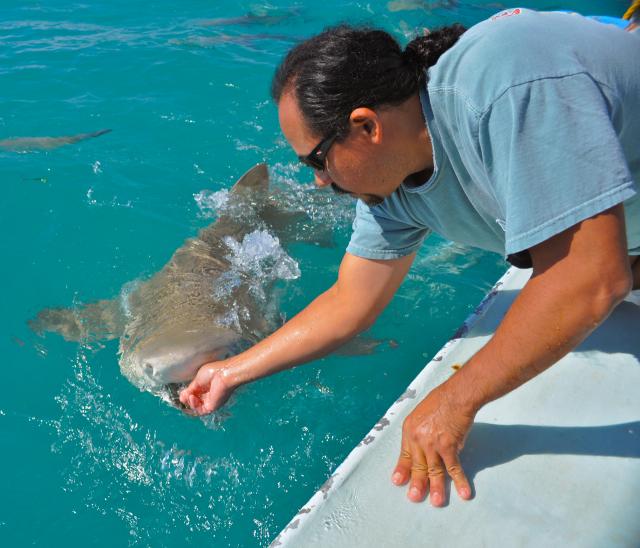Masters of the Reef- Sharks: What We Can Learn from Them
 Sharks are well regarded as the keepers of the oceans. They’ve been on the earth for over 500 millions years -- making them some of the oldest creatures on our planet. On a much shorter timeline, humans have only been around for around 2 million years and evolved with a healthy fear of being eaten. Over the centuries, our successful ancestors recognized and responded to that fear, and passed that fear down to us. Because this fear is a survival instinct, it must be validated and addressed before we can feel truly comfortable in our daily lives. Fortunately it’s relatively easy to address that fear. All we must do is identify those predators in our environment that will eat us and then avoid them. The trick is, in today's modern Western world, there are no large animals running wild through our neighborhoods to kill us. Yet, for us to feel safe and comfortable -- to fall in love, raise children, care for the elderly, take on global causes -- we must respect that basic, instinctual fear. It turns out sharks are the perfect predator to which we can assign our fear. Why? From a psychological perspective, because we know very little about sharks, it’s easy to villainize them -- and popular media has responded by broadcasting falsehoods, preying on our fear to boost advertising dollars and viewership. From a situational perspective, it’s easy to keep ourselves away from sharks by staying out of the ocean. Unfortunately, we are responding to widespread fear of sharks without knowing the facts. For instance, sharks do not prey on humans or gain sustenance from our flesh. In fact, as an apex predator, sharks likely paved the way for human evolution. Sharks are not man-eating machines. This misconception is contradictory to how they normally behave in the wild. In truth, sharks serve to maintain a healthy balance in the ocean, helping to provide the earth and its inhabitants with food, oxygen, and water, and thus, a balanced atmosphere. This presentation is not intended to convince people to swim with sharks, but rather to rethink our fear of sharks, so that perhaps we can rethink other fears we live with, turning misconceptions into knowledge and opportunity, and fear into friendships and positive actions. For those who attended his presentation a few years ago, David will be including even more shark adventures in this presentation.
Sharks are well regarded as the keepers of the oceans. They’ve been on the earth for over 500 millions years -- making them some of the oldest creatures on our planet. On a much shorter timeline, humans have only been around for around 2 million years and evolved with a healthy fear of being eaten. Over the centuries, our successful ancestors recognized and responded to that fear, and passed that fear down to us. Because this fear is a survival instinct, it must be validated and addressed before we can feel truly comfortable in our daily lives. Fortunately it’s relatively easy to address that fear. All we must do is identify those predators in our environment that will eat us and then avoid them. The trick is, in today's modern Western world, there are no large animals running wild through our neighborhoods to kill us. Yet, for us to feel safe and comfortable -- to fall in love, raise children, care for the elderly, take on global causes -- we must respect that basic, instinctual fear. It turns out sharks are the perfect predator to which we can assign our fear. Why? From a psychological perspective, because we know very little about sharks, it’s easy to villainize them -- and popular media has responded by broadcasting falsehoods, preying on our fear to boost advertising dollars and viewership. From a situational perspective, it’s easy to keep ourselves away from sharks by staying out of the ocean. Unfortunately, we are responding to widespread fear of sharks without knowing the facts. For instance, sharks do not prey on humans or gain sustenance from our flesh. In fact, as an apex predator, sharks likely paved the way for human evolution. Sharks are not man-eating machines. This misconception is contradictory to how they normally behave in the wild. In truth, sharks serve to maintain a healthy balance in the ocean, helping to provide the earth and its inhabitants with food, oxygen, and water, and thus, a balanced atmosphere. This presentation is not intended to convince people to swim with sharks, but rather to rethink our fear of sharks, so that perhaps we can rethink other fears we live with, turning misconceptions into knowledge and opportunity, and fear into friendships and positive actions. For those who attended his presentation a few years ago, David will be including even more shark adventures in this presentation.



Some Title



